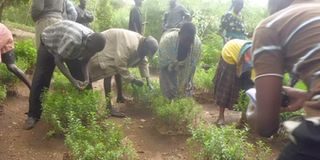One man’s passion leads to change in community

Members of Emeleku Agro Pastoral Field School in their nursery. PHOTO BY LOMINDA AFEDRARU
Anthony Arukol’s passion for growing different types of trees and encouraging others to do the same is leading to a change in his community. The benefits include better fodder for cattle and income generation through sale of seedlings. Lominda Afedraru talked to him.
My name is Anthony Arukol, a mixed farmer in Lopedru village, which is found in Nakapiripirit District with a keen interest in nursery tree planting.
In a training supported by UN Development Programme, I learnt how to grow different types of trees in nursery beds. I began growing mainly Kei Apple tree species, which is mainly used for fencing homesteads.
Developed a passion
Later I began venturing in growing other types especially fruit trees such as pawpaw, avocado, mangoes, and oranges, and also Luciana, a fodder tree species basically for feeding my animals.
As I developed the passion to venture in nursery tree growing, little did I know that I would do it for commercial purposes.
This is because those who trained us were encouraging individuals to stop cutting natural trees for fencing homesteads and use Kei apple trees instead.
What I did was to get cuttings from mature Kei Apple trees from people who already had them in their backyard and began growing it at my home as a multiplication seed.
I used to give out the seedlings free of charge to people who are interested in growing this tree species.
I later got engaged heavily in growing Luciana fodder tree to feed livestock. This tree species is very rich in protein and once animals are fed on it, they become less prone to tick-borne diseases and are capable of producing high quality milk.
In 2013, when the Food and Agriculture Organisation (FAO) was implementing different programmes to boost farmers’ incomes they managed to organise us into a group that can take the tree planting initiative as business enterprise.
Our farmers’ group called Emeleku Agro Pastoral Field School comprises 30 members and we have expanded our activities by incorporating other tree species such as acacia, neem tree, Makhamia tutea, which is good for timber, wood lock, Eucalyptus and fruit trees such as guava and oranges. There is also red pepper.
The group is conducting the tree nursery activity close to a stream to make it easy for us to carry out irrigation during times of drought.
We are specifically growing red pepper which we pound and we spray the powder on the trees to prevent pest and disease infection.
Value of different trees
Members of the group obtain seedlings of the fruit trees from what they purchase for home consumption in the market. But for Kie apple and other tree species, the seedlings are collected from those who are already growing them in their homesteads.
For the entire year, the group has been selling the different tree species to the local people as well as some non-governmental organisations who are trying to promote tree planting in different parts of Karamoja but on a small scale.
We have different prices for the different tree species ranging from Shs400 to Shs1,000 with the fruit trees being the most expensive because the demand is high.
Most farmers are interested in purchasing the neem tree because they know it is medicinal and the leaves can be used to preserve what they have harvested and kept in the granaries.
Earnings
As the chairperson of the group I have made great strides because I now own four acres of land. I intend to allocate at least one acre for tree planting though at the moment I have the fruit trees in my backyard for home consumption.
My family has so far harvested oranges, which they sold to the neighbours and from one tree we were able to obtain Shs10,000.
As a group, we began selling seedlings from our nursery beds in July 2013 and by December, we had sales worth Shs800,000.
Part of it will be shared among the members and the rest we shall save it in our group savings scheme.
With the passion I have for this project, I am now encouraging members to utilise part of the land for tree planting because I have realised it is good source of income.
Realised importance
I am also aware that lack of trees can be a challenge to pastoral farmers in the Karamoja region because our animals need tree sheds especially during dry season.
Secondly, since the community has realised the importance of crop production, they are going to clear all their land and this will lead to effects of climate change such as prolonged dry spell which is already affecting the region.
Our group is looking at using the money earned from tree planting for educating our children as well as change diet by consuming fruits, which have not been part of our traditional diet.
Apart from our group, there are other six different groups involved in tree planting in Nakapiririt District but in different villages with similar structures.




